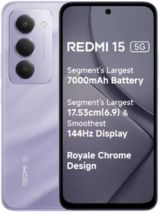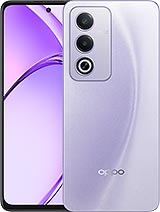iQOO Z9x alternatives
Tap above to see alternatives.
Samsung Galaxy Z Flip5 alternatives
Tap above to see alternatives.
Samsung Galaxy Z Flip5

Samsung Galaxy Z Flip5
-
Snapdragon 8 Gen 2
4 nm
-
3700 mAh
25W
-
6.7"
1080x2640 pixels
-
12 MP
4K@30/60fps
- Specs
4x2.2 GHz Cortex-A78
4x1.8 GHz Cortex-A55
1x3.36 GHz Cortex-X3
2x2.8 GHz Cortex-A715
2x2.8 GHz Cortex-A710
3x2.0 GHz Cortex-A510
6GB 128GB (UFS 2.2)
8GB 128GB (UFS 2.2)
8GB 512GB (UFS 4.0)
f/1.8, (wide), 1/1.95", 0.8µm, PDAF
2 MP
f/2.4, (depth)
f/1.8, 24mm (wide), 1/1.76", 1.8µm, dual pixel PDAF, OIS
12 MP
f/2.2, 123˚ (ultrawide), 1.12µm
1080p
1080p@60/240fps
720p@960fps
f/2.1, (wide)
f/2.2, 23mm (wide), 1.22µm
SIM1: Nano, SIM2: Nano (Hybrid)
SIM1: Nano, SIM2: eSIM
8 5G bands
n1, n3, n5, n8, n28, n40, n77, n78
16 5G bands
n1, n2, n3, n5, n7, n8, n12, n20, n25, n28, n38, n40, n41, n66, n77, n78
In this performance comparison, the Samsung Galaxy Z Flip5 with its Qualcomm Snapdragon 8 Gen 2 (4nm) performs better than the iQOO Z9x with the Qualcomm Snapdragon 6 Gen 1 (4nm), thanks to superior chipset efficiency.
Samsung Galaxy Z Flip5 offers 4 years of OS updates, whereas iQOO Z9x provides 2 years. For security updates, Samsung Galaxy Z Flip5 offers 5 years of support compared to iQOO Z9x's 3 years.
Samsung Galaxy Z Flip5 features a superior AMOLED display, while iQOO Z9x comes with an LCD panel. Both smartphones offer the same 120 Hz refresh rate. Samsung Galaxy Z Flip5 also boasts a brighter screen with 1750 nits of peak brightness, enhancing outdoor visibility. Both phones have the same screen resolution.
iQOO Z9x comes with a larger 6000 mAh battery, which may offer longer usage on a single charge. iQOO Z9x also supports faster wired charging at 44W, compared to 25W on Samsung Galaxy Z Flip5. Samsung Galaxy Z Flip5 supports wireless charging at 15W, while iQOO Z9x lacks this feature.
Samsung Galaxy Z Flip5 offers better protection against water and dust with an IPX8 rating.
- iQOO Z9x – Check price here
¹ Scores can vary even with the same chipset due to RAM, thermals, and software optimization.











